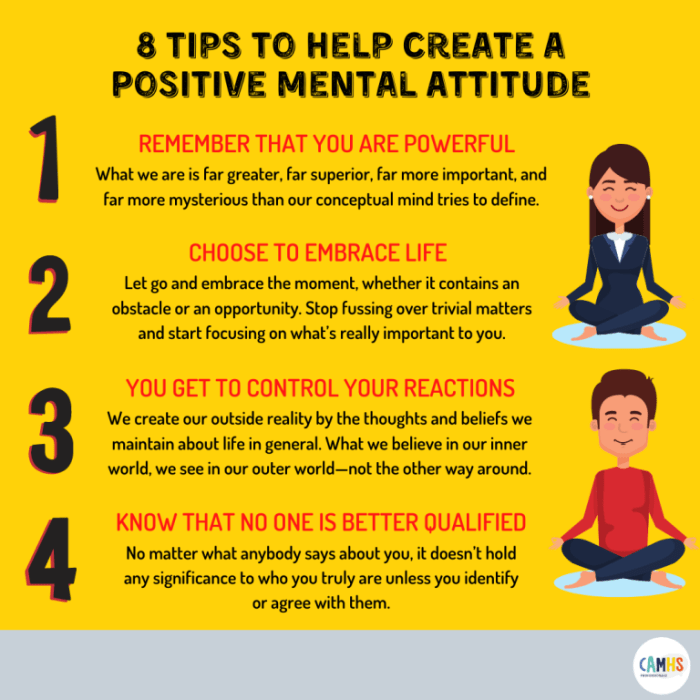Positive Thinking Tips is all about shifting your mindset to a more optimistic outlook, influencing every aspect of your life for the better. From boosting mental health to enhancing relationships, these tips are your key to a brighter future.
Discover how to incorporate positivity into your daily routine, challenge negative thoughts, and create a supportive environment that fosters growth and happiness.
Introduction to Positive Thinking Tips
Positive thinking is a mindset that focuses on the good and looks for the silver lining in every situation. It involves cultivating a hopeful and optimistic outlook towards life, which can have a profound impact on our mental and physical well-being. By choosing to see the positive side of things, we can reduce stress, improve our mood, and even boost our immune system.
Impact on Mental and Physical Well-being
- Positive thinking can lower levels of stress hormones in the body, reducing anxiety and improving overall mental health.
- Optimistic individuals tend to have better cardiovascular health and a stronger immune system, leading to fewer illnesses and faster recovery.
- Studies have shown that positive thinking can increase lifespan and improve quality of life as we age.
Improving Relationships and Quality of Life
- Positive thinking can enhance communication and foster better relationships with friends, family, and colleagues.
- By maintaining a positive attitude, we attract like-minded individuals and create a supportive social network.
- Optimism can help us navigate challenges more effectively and bounce back from setbacks with resilience and determination.
Techniques for Cultivating Positive Thinking: Positive Thinking Tips
Developing a positive mindset is essential for overall well-being and success. Here are some practical tips to help you incorporate positive thinking into your daily routines:
Mindfulness Practices
Mindfulness involves being fully present in the moment and aware of your thoughts and feelings without judgment. This practice can help promote positive thinking by allowing you to focus on the present and let go of negative thoughts.
- Practice deep breathing exercises to center yourself and calm your mind.
- Engage in meditation to cultivate a sense of inner peace and reduce stress.
- Pay attention to your surroundings and appreciate the beauty in the present moment.
Gratitude Journaling
Keeping a gratitude journal can significantly impact your mindset and overall happiness. By regularly writing down things you are grateful for, you train your brain to focus on the positive aspects of your life.
- Set aside time each day to write down three things you are grateful for.
- Reflect on the positive experiences of the day and express gratitude for them.
- Notice how your perspective shifts as you focus on the good in your life.
Overcoming Negative Thought Patterns

Negative thought patterns can have a significant impact on mental health, leading to increased stress, anxiety, and feelings of inadequacy. It is essential to recognize these patterns and develop strategies to challenge and reframe them into positive ones. Self-compassion plays a crucial role in combating negative self-talk and promoting a healthier mindset.
Identifying Common Negative Thinking Patterns
- Black and white thinking: Viewing situations as either all good or all bad, without considering the nuances or gray areas.
- Overgeneralization: Drawing broad conclusions based on one negative experience, leading to a distorted view of reality.
- Catastrophizing: Assuming the worst possible outcome will occur, magnifying the impact of negative events.
Strategies for Challenging and Reframing Negative Thoughts
- Practice mindfulness: Become aware of your thoughts and emotions without judgment, allowing you to challenge negative patterns more effectively.
- Evaluate evidence: Examine the facts and evidence supporting your negative thoughts, questioning their validity and credibility.
- Replace negative with positive: Reframe negative thoughts into more balanced and realistic perspectives, focusing on solutions and positive outcomes.
The Role of Self-Compassion in Combating Negative Self-Talk, Positive Thinking Tips
- Show kindness to yourself: Treat yourself with the same compassion and understanding you would offer a friend facing similar challenges.
- Acknowledge imperfections: Accept that everyone makes mistakes and experiences setbacks, recognizing that self-compassion allows for growth and learning.
- Cultivate self-acceptance: Embrace your strengths and weaknesses, fostering a sense of self-worth and confidence in your abilities.
Surrounding Yourself with Positivity

When it comes to cultivating a positive mindset, surrounding yourself with positivity is key. The environment we immerse ourselves in has a significant impact on our thoughts, emotions, and overall well-being. By creating a supportive and uplifting environment, we can better navigate life’s challenges and setbacks with a positive outlook.
Importance of Positive Influences
Surrounding yourself with positive influences can help boost your mood, increase motivation, and enhance resilience. Whether it’s spending time with optimistic friends, engaging in activities that bring you joy, or even decorating your space with uplifting quotes and images, these positive stimuli can shape your mindset and outlook on life.
Tips for Creating a Supportive Environment
- Avoid negative influences: Limit exposure to people or situations that drain your energy or promote negativity.
- Cultivate a positive circle: Surround yourself with supportive friends and family members who uplift and encourage you.
- Practice gratitude: Keep a gratitude journal to focus on the positive aspects of your life and cultivate a sense of appreciation.
- Create a peaceful space: Design a calming environment at home or work with soothing colors, plants, or meaningful decor.
Impact of Social Media and Curating a Positive Online Space
Social media can be a powerful tool for connection and inspiration, but it can also be a source of negativity and comparison. To curate a positive online space:
- Follow accounts that inspire and uplift you, unfollowing those that trigger negative emotions.
- Engage with positive communities and participate in discussions that promote growth and positivity.
- Set boundaries: Limit your time on social media and be mindful of how certain content affects your mood and self-esteem.
